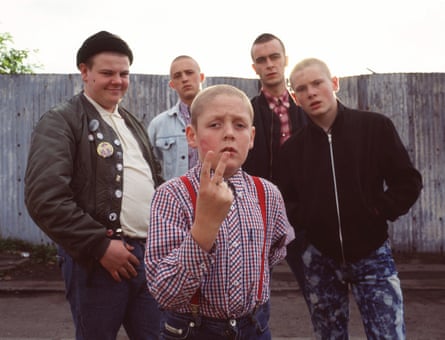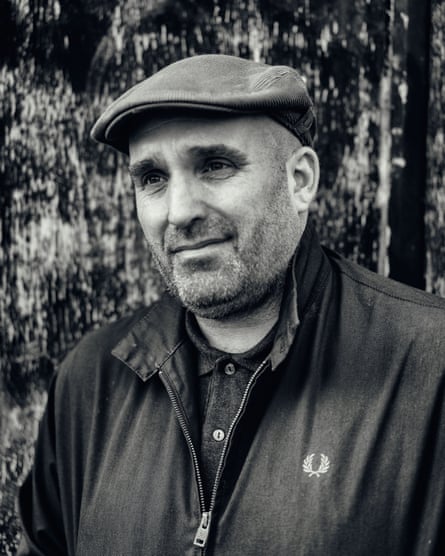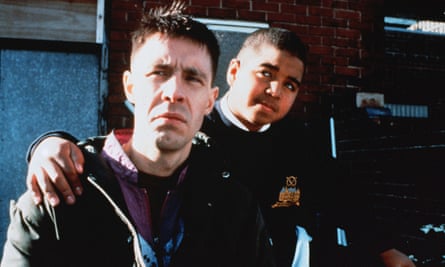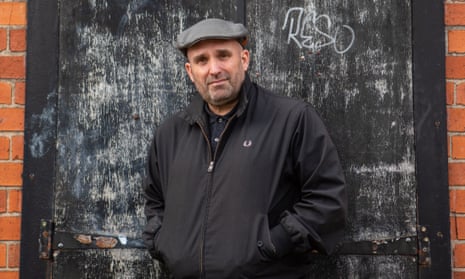I’ve interviewed director Shane Meadows a few times now, and it’s always been fun. He’s an entertaining person to spend an hour with: enthusiastic, emotional, funny, a natural talker. Plus there’s lots to talk about, as his work is great. From his first features, Small Time (1996) and A Room For Romeo Brass (1999), through Dead Man’s Shoes, into 2006’s This Is England and the three TV spin-off series that came out of that (This Is England 86, 88 and 90), as well as his Stone Roses comeback documentary, Made of Stone, Meadows makes brilliant British films and telly. He calls himself “kitchen sink”, but he’s a rare combination of artist, storyteller and near-documentarian who often uses his life growing up in Uttoxeter in Staffordshire as inspiration. His methods – lengthy casting process, lots of rehearsals – mean that he helps actors, and people who have never acted before, to give authentic and award-winning performances. His work leaves me in bits.
So I’m looking forward to seeing him again. Except that this interview turns out to be far from fun. It goes very dark, very quickly. If I were a continuity announcer, I’d say something like: the following contains content that some people might find upsetting.
Still, we start upbeat enough. We meet in the downstairs room of Nottingham’s Broadway Cinema, near to his home. Meadows has his foot in a medical boot – he has a running injury – but otherwise all is good; in a smart parka and jeans, he’s his usual ebullient self.
We’re here to talk about his new four-part series on Channel 4, The Virtues, directed by Meadows and co-written with regular writing partner Jack Thorne. It stars Stephen Graham as Joseph, a Liverpudlian who returns to Ireland in search of his past. It’s a gripping and moving watch, driven by truthful performances; but it’s also a step up. The Virtues moves out of Meadows’s established world of small-town crime and hectic wit and into something more lyrical.
“I always wanted to make a film where people didn’t talk,” he says. “I’d watch some European films and it would be just people ambling along in a car – 15, 20 minutes where no one would speak and it would be completely compelling. And I could never do it.”
With The Virtues, he has. Especially during the first and second episodes, there is a real sense of things unsaid. This is unusual in Meadows’s work, where characters tend to speak quickly and truthfully, and the violence, when it comes, is unexpected. In The Virtues, you can feel repressed pain, sense it leaking out and driving the action, even though the plot is unclear for quite some time. This is mostly due to an immense performance from Graham, who is transformed, far from the character he’s played before for Meadows.
In This Is England, Graham was Combo, the violent NF supporter who came out of prison to wreck Woody’s amiable little skinhead crew. He was macho, scary and horrible (though slightly redeemed in TIE 88). In The Virtues, however, Graham plays someone else entirely: a quiet, middle-aged man just about holding it together.
Joe has a son, Shea, with an ex-partner, and we see his reaction to them leaving Liverpool for a new life. Initially, he keeps a lid on things, but his trauma spills into a pub scene that is jovial but so tense that at one point I had to leave the room. There’s a queasy post-chucking-out stumble around Liverpool’s kebab shops. Soon, we follow Joe as he gets the ferry to Ireland, to try to excavate his past.
Graham is absolutely terrific: a career best, I would say, and his is a CV packed with excellence. There’s also a wonderful performance from Helen Behan, whom Meadows met some years ago, on holiday in Bettystown, a coastal town north of Dublin.
“She approached me and said she’d always wanted to act. I took her number and said, ‘I might be in touch or I might forget.’”
But he remembered, and cast her as a nurse in TIE 88. In The Virtues, Behan is full of heart, funny and stern. Rising star Niamh Algar is brilliant too, plus – plus! – the score is by PJ Harvey. Meadows wanted a soundtrack as opposed to songs, as he’d had in This Is England, and he’d thought of Harvey. And then, amazingly, she emailed him out of the blue, saying she’d like to work with him. There’s a beautiful sequence of Joe trudging through the Irish countryside in the rain, all set to Harvey’s fantastic music.
Anyway, you should watch The Virtues. I don’t want to give away too many spoilers, but I have to, because Meadows wants to talk to me about a specific incident that led to him making the series. In fact, he’s revved himself up to do this interview.
“I only want to talk about this once,” he says. “You’re the only person I’m going to tell. There was an event in my life that happened at a fucking unbelievably unlucky moment in time…”
OK, I say, a bit uncertain as to what he’s going to tell me. And then he tells me. In the summer of 1982, Meadows’s dad, Arty, was taken into custody on suspicion of murder. Arty, a lorry driver, had found the body of an 11-year-old schoolgirl, Susan Maxwell, beside the A518 near Uttoxeter, and the police wrongly thought he might have killed her.
Obviously, this was a traumatic time for Shane and his family. The media were camped outside their house, “trying to buy photographs off neighbours”; his dad was in the cells, and it was decided that it would be better if Shane and his sister went elsewhere for a bit. Off went his sister to a camp for CB radio enthusiasts (it was the 1980s), and Shane was sent to his aunty’s, on the other side of Uttoxeter. She tried her best to keep Meadows away from the news, but he remembers going into a newsagent’s and seeing the front pages of the papers: “They had my name, and my sister’s. They put a picture of my dad in when he was 18, when he was a rocker – rather than 28 and a dad of two – so he looked like he could be a really dangerous bastard.”
Upset and confused, he left his aunt, went to a nearby park and sat on a swing.
“It was already a wank old day,” he says. “And then these two brothers came up.”
One was around Shane’s age, the other about four years older. They picked on him – “they mentioned my dad” – scared him, and made him go into the woods behind the park. And once they’d got him in there, the older brother sexually abused him over a long period of time. Shane was nine.
Immediately after he left the woods, he says, he thought to himself, “If you don’t say anything, it never happened… if you just don’t tell anyone, it didn’t happen.” And he never did tell anyone. He returned to his aunt’s house. At some point, he remembers going into the back garden and hearing the two boys playing on their bikes outside. He had a panic attack and went indoors.
When he returned to his parents’ following his dad’s release, he regressed for a while. “I can remember this feeling of abomination. I started wetting the bed, all the classic signs were there” – but everyone thought it was because his dad had been suspected of murder. Shane squashed the whole traumatic, terrible incident down into something hard and dark and tiny, and deliberately buried it as deep as he could inside. In fact, he actually forgot about it.
This seems almost unbelievable – “I know, it’s mad. I knew they’d picked on me, bullied me, but that was it” – but it’s true. He forgot about it so thoroughly that when he changed school soon after and saw the bigger boy, all he knew was that he was really frightened of him. “It was like every ounce of me knew, but I didn’t remember it, so I must’ve blocked it.”
Meadows successfully blocked what he calls “the incident” or “the event” – but it affected everything. “You can feel that sense of panic, but not understand it or why it affects your life on a daily basis,” he says.

His life changed. When he was around 11, he joined an older gang of skinheads, so that he would have protection, without really knowing why. He went a bit nuts in his teens, did drugs, started petty thieving. As an adult, again without knowing why, he always cut corners when walking the dog took him too close to any woods. He went through his whole life not directly recalling the event. Not knowing what had happened to him.
“But every five or six years, I’d have these massive depressions or anxiety attacks,” he says. “Really bad. Dragging me into the pits of hell, it felt like the Book of Revelations.” The attacks would last a few months and sometimes he’d have to go to a clinic (he did after finishing This Is England 90). He had his first “nervy b”, as he calls them, when he was 20.
In his 30s, he tried counselling, but that didn’t really help. It wasn’t until two years ago, when he went to a clinical psychologist, that something really changed. The psychologist asked Meadows lots of technical questions (about 450 of them) and found that his problem areas were “extreme anxiety around going away from home, and feeling that the world was a bad place”. He diagnosed Shane with PTSD and prescribed a particular treatment.
“I promised my wife I wouldn’t speak about this, but anyway, here goes, baby. Have you heard of EMDR? You put on these headphones, and there are different sounds in your ears, like a buzz in one and a bleep in the other.”
EMDR (Eye Movement Desensitisation and Reprocessing) is a technique often used for PTSD, whereby the patient has to recall the moment of trauma while listening to separate sounds in each ear (or tapping different knees, or looking at different things).
“The awful thing about that event, though, is that I couldn’t remember it, so it was like I was living it for the first time.”
At the first session, the psychologist asked him to think back to when he was in the park. “I was like, ‘Why? They were just twats to me because of my dad.’” But the psychologist insisted. The first thing he remembered was walking away from the park, telling himself if he didn’t mention the attack, it never happened. He chucked down the headphones and walked out, “like Tony Soprano”. But as he was walking along, the act of walking reminded him even more of leaving the park: that specific feeling of deliberate pain suppression.
Now, Meadows can remember most of what happened. Not everything – “it’s like a shattered mirror, I have fairly horrific images but I can’t make whole sequences” – but the point of EMDR is not to recall every detail of a traumatic incident, but to access the feelings around it. You stop every three minutes or so, to assess how high your stress levels have become. At the beginning, he says, he was off the scale. He would cry uncontrollably, “snot and toffee everywhere”. In fact, the process was so difficult that he quit a couple of times; but gradually, as he repeated the therapy, his stress levels reduced. Which explains how he can talk about it to me. He’s not cheerful about it, but he is astonishingly straightforward. “I own it now.”
Most of what happened has come back to him. The younger boy wasn’t involved, but just stood aside and let it happen. The older boy was “a right fucking grubby bastard” with “piggy eyes and teeth like fangs”. In Uttoxeter at the time, kids went to lower school until 9, then middle school until 13, and high school after that, and when Meadows changed schools soon after the assault, he found himself in the same school year as the younger brother. Luckily, the older one had just left to go to high school, but he was still hanging around. Meadows would leave school by the back way so he didn’t have to encounter him, sitting on the wall nearby. When Meadows got to high school, the younger brother told him that the older boy had left to become a footballer. “Obviously, he’d been sent to Borstal.”
Anyway, he was gone.
For a while, during the therapy, Meadows was overcome by a desire for revenge. He started trying to track down the brothers, find them, catch them off guard.
“Sit man-to-man without any fucking weapons,” he says. “And see what kind of a person they are. But then I thought, well, this is going to go great if they’ve really changed or they’re broken or whatever, but if they’re still a disgusting, horrible, manipulative, potentially paedophile sort of character, and they smirk at me over the table... then it’s going to go incredibly badly.”

We discuss how revenge is such an important theme in his work. Dead Man’s Shoes is a revenge tale. Lol in This Is England gets revenge on her dad. “It’s not about revenge for revenge’s sake,” he says. “It’s about empathy for people. Like Lol, it’s about that fucking awful scene with Trev where Lol’s dad rapes her. People at talks come up to me and say, ‘I’ve had that experience’ and they thanked me for it, because so many people hear the sentences people get given for rape, and it makes it seem like a milder crime than the disgusting, life-changing thing it actually is.”
Also, many of his films – Romeo Brass, This Is England – examine the unsettling effect of an older, dangerous stranger on a happy friendship group. Meadows used to think this was because of another incident in his background, when his sister went out with an older boy and Shane egged him on to beat up an innocent younger kid. Or another time, when he was kidnapped and held at knifepoint for a day by the ex-boyfriend of his girlfriend (Meadows’s teenage years were colourful). But obviously, the roots went further back. In This Is England Shaun, Shane’s alter ego, joined an older group of kids because he wanted protection. That is exactly what Shane did.
Anyway, once Meadows had got his head around the whole thing, he decided to use it to make The Virtues, with Joe as his alter ego. And there’s another element woven through the new series: a children’s home.
There were a couple of children’s homes near where Meadows grew up and, as a child, he was very conscious of the kids who ran away. He remembers, when he was 11, that a couple of sisters fled a home called Riverside, and stayed in a Victorian public toilets. Meadows brought them blankets and taped down the button on the hand dryer so it would blow all night and keep them warm. He felt real empathy for them, as he did and does for anyone bullied.
“Once you’ve seen someone get properly beaten up, you don’t forget,” he says. “The velocity, the hatred, someone stamping someone’s face into the corner of a room. When you’re stood there holding their coat. That never leaves you.”
When he was young, and going off the rails, his dad got a policeman friend to take Meadows round a children’s home, to scare him. It worked. “All the lads looked like Tim Roth in Made In Britain, there was glue scabs round all the girls’ mouths.” The children’s homes are closed now, but they were centres of abuse: physical, emotional, sexual.
“I think about that,” he says. “I was so affected and [the abuse] only happened once. I’ve had at least three breakdowns as a result; it’s caused me a lifetime of anguish, so imagine what it was like there, all that brutality and you can’t escape. Someone being able to come into your room whenever they liked…”
As I’m absorbing all of this, Shane tells me that, while he was filming The Virtues in February 2018, his mum Gillian was diagnosed with cancer (there’s a dedication to her at the end of the series). She died four weeks later, aged just 63. It was a terrible time, he says, though the dying itself was peaceful – he was there and was able to tell her how much he loved her.

“My sister was the rock,” he says. “I just couldn’t cope.”
He didn’t tell his mum about what he’d found out through his therapy – “it’s a bit much to put that on the parcel shelf before someone dies” – but he’s told the rest of the family.
God, what a couple of years he has had.
“Yeah,” he says, “but it means that I’m not scared now. I mean, what else is there to fear?” Though he admits he can get pretty jumpy around his own kids, and their safety. He has two young boys, aged six and 10, and he’s very protective. His wife keeps his paranoia in check, “or I’d be like the SAS, following them when they go to school, jumping over hedges”. But their lives are very different from his at that age, more monitored: “They do loads of stuff after school, football and rugby and swimming: they don’t just hang out with other kids, like I used to.”
This interview has, strangely, been quite uplifting. Meadows is serious when he talks about what happened to him, but he’s not broken. I notice he often uses “you” rather than “I” when he tells the tale, understanding the assault in a bigger context. He feels sorry for that poor young boy, who was just in the wrong place at the wrong time. His calmness makes it easier to hear his story. Also, he looks great: he’s lost a bit of weight and is sparkly-eyed and clear-skinned. Before he broke his foot, he’d been cycling and running. He even does a bit of meditation. “I used to think all that was a load of crap, but it’s like a safety valve. Better than what I used to do, which was get leathered.”
What he wants to do with the series, he says, other than make a great piece of art, is to emphasise how heroic it is for some people just to live a normal life. That’s why it’s called The Virtues.
“I don’t think we should be celebrating people who’ve made the FTSE 100,” he says. “You don’t know why a tramp is what he is. How could you look down your nose at someone on the street? For some people just to lead a sober life is heroic, way better than running a conglomerate or making political decisions.”
He feels grateful that he’s a filmmaker and can use his films to help his trauma, or his trauma to create films. “From my point of view,” he says, “this was a chance for me to create a safe space, to face my abuser. All I wanted was to be able to sit down with this guy, via Stephen Graham. I’ve always been honest about where my stories come from, how personal they are. It would obviously have been easier for me not to talk about this one, but I’m not making an exception. I’m not scared or ashamed any more. Plenty of people have been through far worse and they’ve told their stories. What happened to me is the reason the series exists.”
The ending of The Virtues doesn’t do quite what you might expect. Meadows didn’t expect it either, but, as is his style, he let the actors involved do what came naturally, tried out a few scenarios and chose the scenes that worked the best. He’s a believer in the human spirit.
“One of the last sessions I had with the psychologist, he said to me, ‘Imagine you could go back and make that event not happen. The risk is that you quite possibly wouldn’t be doing what you’d be doing now. Would you go back and change it?’ And I know I wouldn’t. Having experienced that, and the empathy that comes with it… I’d never swap that in a million years. I certainly wouldn’t swap telling stories. That is just part of my life and I’ve got through it. It’s lovely to know I can.”
The Virtues begins on Channel 4 on Wednesday 15 May at 9pm. The National Association for People Abused in Childhood (Napac) offers free support for adult survivors on 0808 801 0331
‘He leaves you in bits’: Meadows’ finest, by Miranda Sawyer
Small Time (1996)
Made for £5,000, and set in a Nottingham suburb, Meadows’s first full-length film takes us round car boot sales, cafes and front rooms as Malc (Mat Hand) and his mates thieve and sell whatever they can get their hands on. Gavin Clarke, who worked on several Meadows films before his death in 2015, does the soundtrack. Notable for Meadows’s own acting (not bad), and his wig (horrendous).

A Room for Romeo Brass (1999)
Based on Meadows’s childhood, this has Andrew Shim as 12-year-old Romeo, and launched the careers of both Vicky McClure (as Romeo’s sister Ladine) and Paddy Considine as Morell, the older eccentric who befriends Romeo and his friend Gavin (Ben Marshall) and tries to seduce Ladine. Hilarious and scary, with brilliant performances, the DVD features eye-wateringly funny commentary from Meadows and Considine.
Dead Man’s Shoes (2004)
Tense, trippy and terrifying, this revenge thriller with a twist stars Paddy Considine and Toby Kebbell as brothers who return to their hometown, Matlock, to confront the bullies that still live there. Considine burns up the screen with his just-held-in vengeful rage. Features a nauseatingly realistic drugs scene, and an oh-my-God use of a gas mask. Terrific.

This Is England (2006)/This Is England 86-90 (TV series, 2010, 2011, 2015)
The most directly autobiographical of Meadows’s work, This Is England is set in 1983 and stars Thomas Turgoose as Shaun Fields, an unhappy young lad who joins a cheerful skinhead group, led by Woody (Joseph Gilgun) and girlfriend Lol (Vicky McClure). Things go wrong when racist old member Combo (Stephen Graham) comes out of prison and stirs up trouble, beating up Milky (Andrew Shim). A brilliant soundtrack and wonderful performances won the film a Bifa and a Bafta. The Channel 4 series that followed takes the characters in different directions. Lol has her moment in 86; 88 sees Woody and Lol’s relationship falter, then reignite; 90 is a homage to rave culture as well as the culmination of the Milky and Combo relationship. Shaun grows up throughout.
Stone Roses: Made of Stone (2013)
A documentary love letter to Meadows’s favourite band as The Roses reform after a 16-year split. There’s an amazing opening shot by cinematographer Laurie Rose (no relation) at one of the band’s massive homecoming Heaton Park shows. The Roses themselves are never directly interviewed, giving Made of Stone a fan’s eye view. It’s the better for it.











Comments (…)
Sign in or create your Guardian account to join the discussion